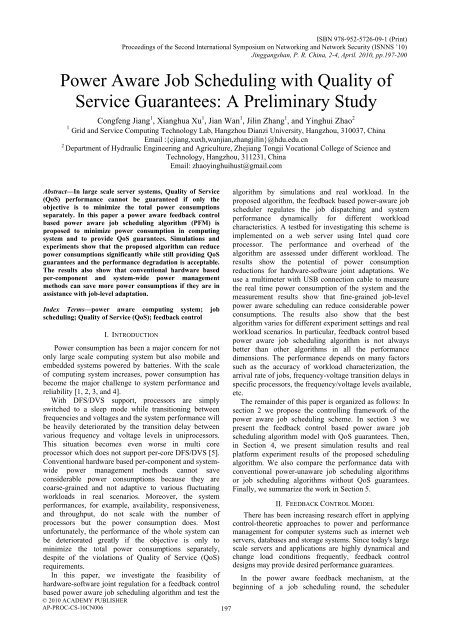Download - Academy Publisher
Download - Academy Publisher
Download - Academy Publisher
You also want an ePaper? Increase the reach of your titles
YUMPU automatically turns print PDFs into web optimized ePapers that Google loves.
ISBN 978-952-5726-09-1 (Print)<br />
Proceedings of the Second International Symposium on Networking and Network Security (ISNNS ’10)<br />
Jinggangshan, P. R. China, 2-4, April. 2010, pp.197-200<br />
Power Aware Job Scheduling with Quality of<br />
Service Guarantees: A Preliminary Study<br />
Congfeng Jiang 1 , Xianghua Xu 1 , Jian Wan 1 , Jilin Zhang 1 , and Yinghui Zhao 2<br />
1 Grid and Service Computing Technology Lab, Hangzhou Dianzi University, Hangzhou, 310037, China<br />
Email :{cjiang,xuxh,wanjian,zhangjilin}@hdu.edu.cn<br />
2<br />
Department of Hydraulic Engineering and Agriculture, Zhejiang Tongji Vocational College of Science and<br />
Technology, Hangzhou, 311231, China<br />
Email: zhaoyinghuihust@gmail.com<br />
Abstract—In large scale server systems, Quality of Service<br />
(QoS) performance cannot be guaranteed if only the<br />
objective is to minimize the total power consumptions<br />
separately. In this paper a power aware feedback control<br />
based power aware job scheduling algorithm (PFM) is<br />
proposed to minimize power consumption in computing<br />
system and to provide QoS guarantees. Simulations and<br />
experiments show that the proposed algorithm can reduce<br />
power consumptions significantly while still providing QoS<br />
guarantees and the performance degradation is acceptable.<br />
The results also show that conventional hardware based<br />
per-component and system-wide power management<br />
methods can save more power consumptions if they are in<br />
assistance with job-level adaptation.<br />
Index Terms—power aware computing system; job<br />
scheduling; Quality of Service (QoS); feedback control<br />
I. INTRODUCTION<br />
Power consumption has been a major concern for not<br />
only large scale computing system but also mobile and<br />
embedded systems powered by batteries. With the scale<br />
of computing system increases, power consumption has<br />
become the major challenge to system performance and<br />
reliability [1, 2, 3, and 4].<br />
With DFS/DVS support, processors are simply<br />
switched to a sleep mode while transitioning between<br />
frequencies and voltages and the system performance will<br />
be heavily deteriorated by the transition delay between<br />
various frequency and voltage levels in uniprocessors.<br />
This situation becomes even worse in multi core<br />
processor which does not support per-core DFS/DVS [5].<br />
Conventional hardware based per-component and systemwide<br />
power management methods cannot save<br />
considerable power consumptions because they are<br />
coarse-grained and not adaptive to various fluctuating<br />
workloads in real scenarios. Moreover, the system<br />
performances, for example, availability, responsiveness,<br />
and throughput, do not scale with the number of<br />
processors but the power consumption does. Most<br />
unfortunately, the performance of the whole system can<br />
be deteriorated greatly if the objective is only to<br />
minimize the total power consumptions separately,<br />
despite of the violations of Quality of Service (QoS)<br />
requirements.<br />
In this paper, we investigate the feasibility of<br />
hardware-software joint regulation for a feedback control<br />
based power aware job scheduling algorithm and test the<br />
© 2010 ACADEMY PUBLISHER<br />
AP-PROC-CS-10CN006<br />
197<br />
algorithm by simulations and real workload. In the<br />
proposed algorithm, the feedback based power-aware job<br />
scheduler regulates the job dispatching and system<br />
performance dynamically for different workload<br />
characteristics. A testbed for investigating this scheme is<br />
implemented on a web server using Intel quad core<br />
processor. The performance and overhead of the<br />
algorithm are assessed under different workload. The<br />
results show the potential of power consumption<br />
reductions for hardware-software joint adaptations. We<br />
use a multimeter with USB connection cable to measure<br />
the real time power consumption of the system and the<br />
measurement results show that fine-grained job-level<br />
power aware scheduling can reduce considerable power<br />
consumptions. The results also show that the best<br />
algorithm varies for different experiment settings and real<br />
workload scenarios. In particular, feedback control based<br />
power aware job scheduling algorithm is not always<br />
better than other algorithms in all the performance<br />
dimensions. The performance depends on many factors<br />
such as the accuracy of workload characterization, the<br />
arrival rate of jobs, frequency-voltage transition delays in<br />
specific processors, the frequency/voltage levels available,<br />
etc.<br />
The remainder of this paper is organized as follows: In<br />
section 2 we propose the controlling framework of the<br />
power aware job scheduling scheme. In section 3 we<br />
present the feedback control based power aware job<br />
scheduling algorithm model with QoS guarantees. Then,<br />
in Section 4, we present simulation results and real<br />
platform experiment results of the proposed scheduling<br />
algorithm. We also compare the performance data with<br />
conventional power-unaware job scheduling algorithms<br />
or job scheduling algorithms without QoS guarantees.<br />
Finally, we summarize the work in Section 5.<br />
II. FEEDBACK CONTROL MODEL<br />
There has been increasing research effort in applying<br />
control-theoretic approaches to power and performance<br />
management for computer systems such as internet web<br />
servers, databases and storage systems. Since today's large<br />
scale servers and applications are highly dynamical and<br />
change load conditions frequently, feedback control<br />
designs may provide desired performance guarantees.<br />
In the power aware feedback mechanism, at the<br />
beginning of a job scheduling round, the scheduler
















